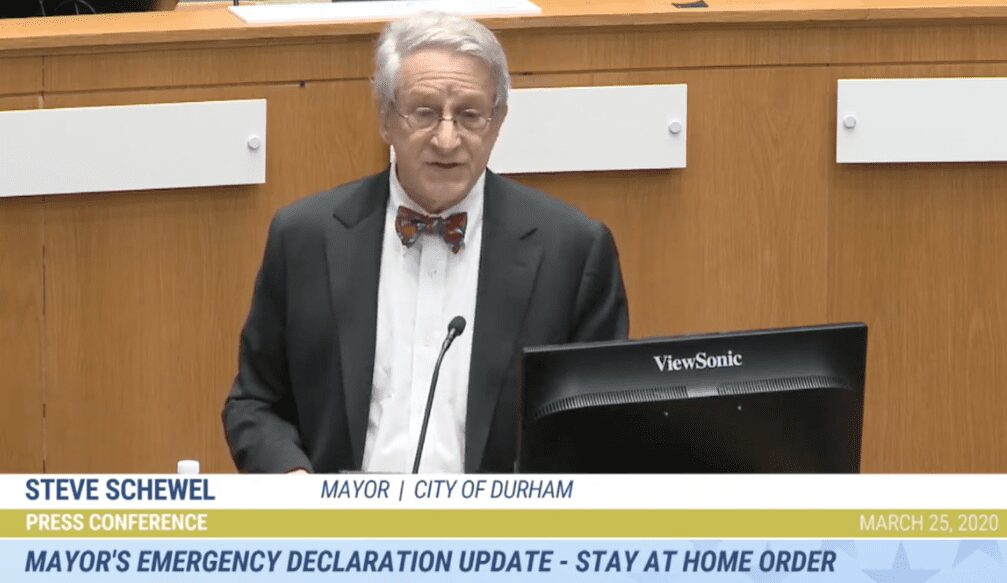In a bold effort to slow the spread of the coronavirus, Mayor Steve Schewel announced a sweeping stay-at-home policy that will limit when people can leave their homes but allow a host of exemptions for everything from grocery shopping to doctor visits to playing tennis.
He said it was critical to act now before Durham is overwhelmed by the virus.
“This is our window for social distancing to work. This is our window to intervene,” he said.
He said the stay-at-home order assures that the maximum number of residents will self-isolate while still keeping essential businesses open. Those businesses include grocery stores, gas stations, pharmacies, and stores selling vital household goods.
Schewel said the policy also allows Durham residents to continue to go outdoors for exercise, but he emphasized everyone must practice social distancing. He said contact sports – he mentioned basketball — were prohibited. But walking, hiking, running, biking, golfing and playing tennis are permitted.
The order will be in effect from Thursday at 6 p.m. until April 30, although Schewel said it could be extended or shortened.
Schewel said the order is legally enforceable, although no one will be arrested unless they “continuously and egregiously offend.”
Durham County has the state’s second-highest number of confirmed cases of the coronavirus – 74 in Tuesday evening’s tally. Mecklenburg County, which includes Charlotte, has, 142.
“There is no need to fear this virus if we act. And the way to act is to stay at home,” Schewel said.
While the number of cases in Durham remains low, Schewel noted that the trend line of coronavirus in the United States is following that of Italy. He said it was urgent to act now to prevent the same magnitude of fatalities that occurred there.
He said he also hopes the order will keep the Duke Hospital from being overwhelmed with cases.
The order includes an exemption for educational institutions, including North Carolina Central University and Duke University, to stay open for essential research.
Wake County was set to make an announcement Wednesday about a stay-at-home order, the Herald Sun reported. Schewel said he expects the order to be very similar.
A stay-at-home order has not yet been announced statewide, but Schewel is hopeful the governor will adopt one soon. He has been in contact with other North Carolina cities and counties which will adopt similar policies soon.
“Our cities are all experiencing this same crisis,” he said.
Mecklenburg announced a policy similar to Durham’s Tuesday afternoon that orders residents to stay at home and bans gatherings of more than 10 people. The order limits travel on public roads to those needing medical care, food, or other trips vital to “well-being.” Mayors of nearby towns Cornelius, Matthews, Davidson, Mint Hill, Huntersville, and Pineville also signed the order.
The stay-at-home approach by the North Carolina cities and counties is similar to policies in 18 states, 31 counties, and 13 cities as of Tuesday, according to a New York Times summary. Soon the majority of Americans will live under similar restrictions, the Times said.
Punishments vary by location. Violators in Hawaii may face up to a year in jail or $5,000 in fines.
Schewel’s stay-at-home order followed escalating restrictions in the city. On March 13, he ordered a state of emergency restricting gatherings to fewer than 100 people. He later expanded the order to close gyms, health clubs, and theaters.
Then, on March 17, Governor Roy Cooper banned dining in at restaurants and bars.
On Monday, Durham closed all city facilities, including City Hall, police headquarters, fire stations, playgrounds, and park restrooms. Parks, trails, and greenways remained open.
Kristi Sturgill






Comments are closed.